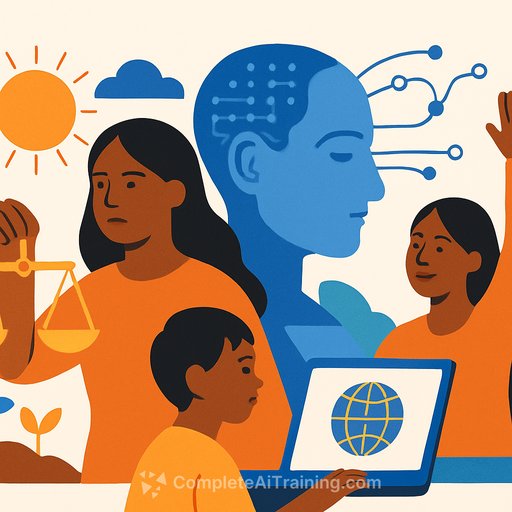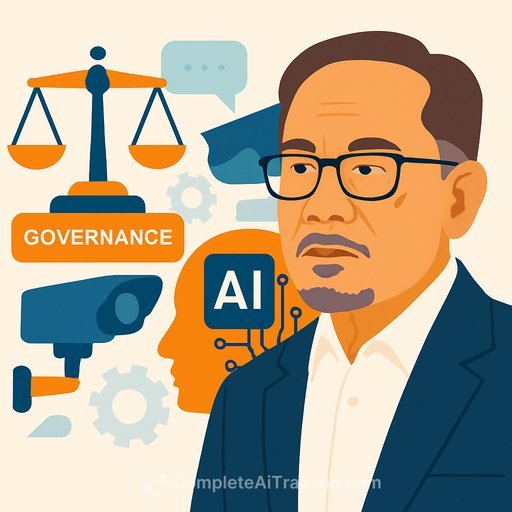Sustainable Development
Is this how you can ensure climate justice in the age of AI?
Aug 4, 2025
Artificial intelligence (AI) is playing an increasing role in climate action—from predicting extreme weather events to optimizing energy systems. But as AI tools become more embedded in sustainability efforts, ensuring climate justice must remain a priority. This means making sure that vulnerable populations benefit fairly and are not left behind.
Climate justice demands fair treatment and meaningful involvement of all people affected by climate change, regardless of background, income, race, gender, or location. The design and deployment of AI in environmental efforts must reflect this principle.
Recent studies highlight how socially vulnerable groups—defined by race, income, and age—face greater risks from climate impacts like heatwaves, poor air quality, and flooding. As AI increasingly guides decisions on public services and infrastructure, there's a real danger that biased systems could deepen inequalities instead of resolving them.
These concerns are already relevant. AI is used in disaster relief, pollution monitoring, and energy management. If these systems rely on biased data or exclude input from marginalized communities, they risk reinforcing the disparities climate justice works to eliminate.
How to reinforce climate justice when deploying AI:
Design for fairness and tackle bias in environmental AI
AI systems reflect the data and assumptions they are built on. In climate applications, bias can be subtle yet damaging. For example, if air-quality sensor placement depends on historical complaints submitted via smartphones or laptops, poorer or rural areas with limited internet access might be overlooked. This leads to under-monitoring and fewer resources where they are needed most.
Addressing this requires collecting inclusive data that represents all communities, including those often excluded from digital ecosystems. Transparency is also key: affected communities should understand how AI decisions are made and have a say in shaping these tools. This involves opening AI models to public scrutiny and embedding participatory design from the start.
Algorithmic impact assessments—similar to environmental impact assessments—can help evaluate both societal and environmental effects of AI systems.
Empower marginalized communities through data sovereignty
Data holds power, but historically this power has been unequally shared. Indigenous and marginalized communities possess valuable ecological knowledge that can improve AI-driven climate solutions. However, they are often treated merely as data sources rather than partners in decision-making.
For instance, AI-powered deforestation monitoring that excludes input from local indigenous groups risks making ineffective or harmful decisions. Integrating traditional ecological knowledge with AI analysis produces stronger outcomes.
Policy frameworks must support local justice by giving communities control over their data and providing training to complement AI models. Community-led initiatives, such as drone monitoring of coastal erosion in Pacific Island nations or data sovereignty efforts by First Nations in Canada, offer effective examples.
The UN’s 2024 report on AI governance highlights the need for inclusive frameworks that protect human rights and respect data sovereignty—the right of communities to control how their environmental data is collected, interpreted, and used.
Foster accountability and ensure just regulatory frameworks
Ethical governance is essential to hold both private and public actors accountable for AI-driven climate decisions. International cooperation, environmental and algorithmic impact assessments, and oversight are critical to ensure AI supports climate justice.
When AI decisions cause disproportionate harm, affected communities need accessible channels for redress. For example, if an AI system optimizes waste collection routes for efficiency but reduces service frequency in poorer neighborhoods, residents should be able to raise concerns and have them addressed.
The UN’s Advisory Body on Artificial Intelligence calls for a globally inclusive governance structure emphasizing adaptability and human rights protection. These principles are vital in climate contexts where decisions can have profound consequences.
Regulatory frameworks must be enforceable. Voluntary guidelines alone won’t protect against harm as AI becomes integral to public infrastructure and climate policy.
AI offers significant potential to accelerate climate solutions, but only if applied with care, foresight, and justice. We must continually ask: who benefits, who is left behind, and who decides? Embedding fairness, participation, and accountability into AI systems ensures these technologies serve all communities fairly.
Listening to those most affected, sharing power, and designing with communities—not just for them—will help AI become a genuine tool for inclusive and sustainable change.
Your membership also unlocks:





